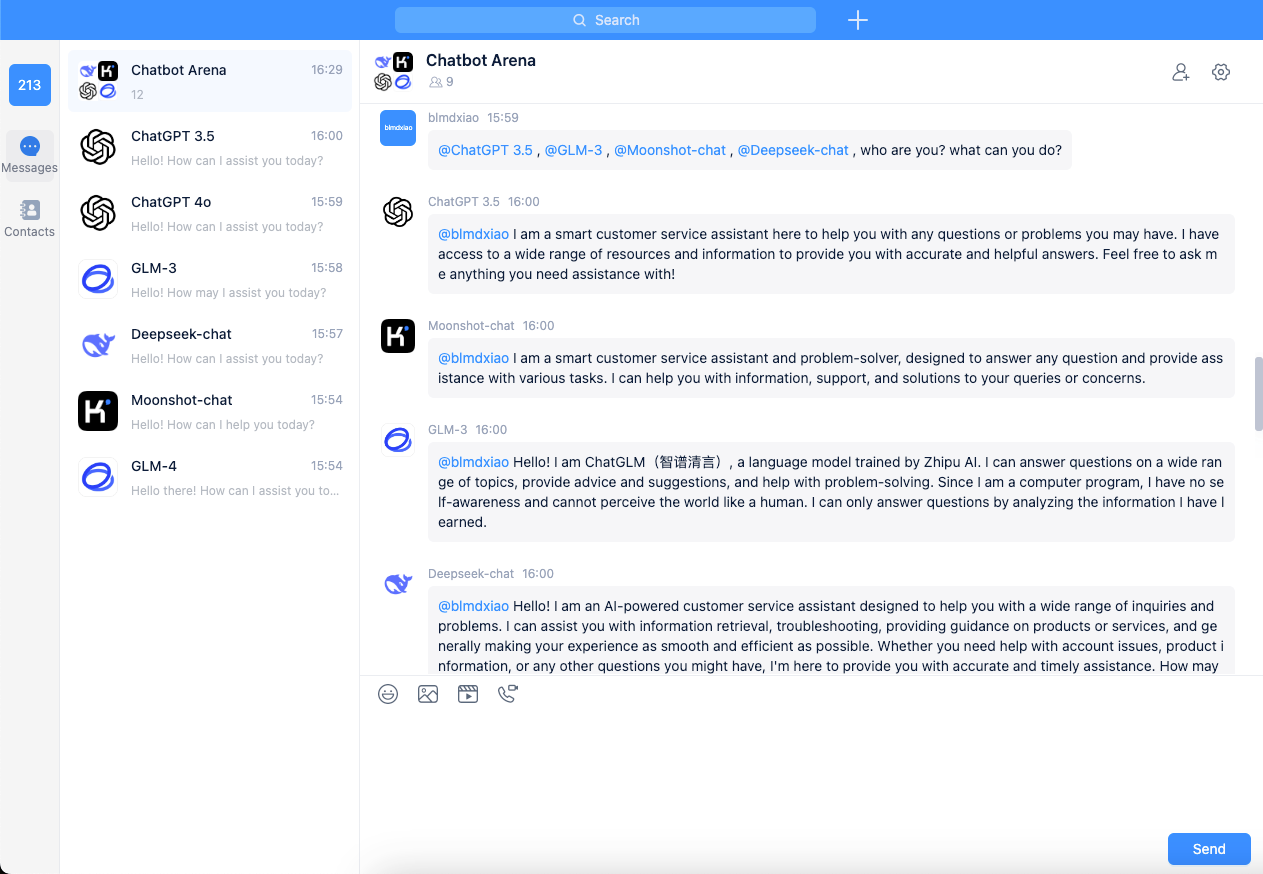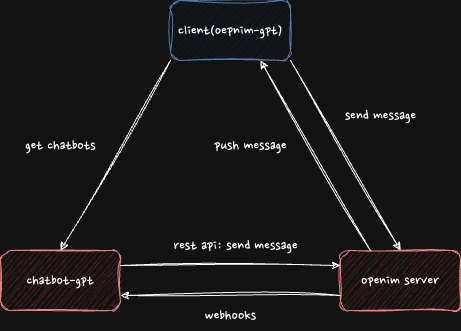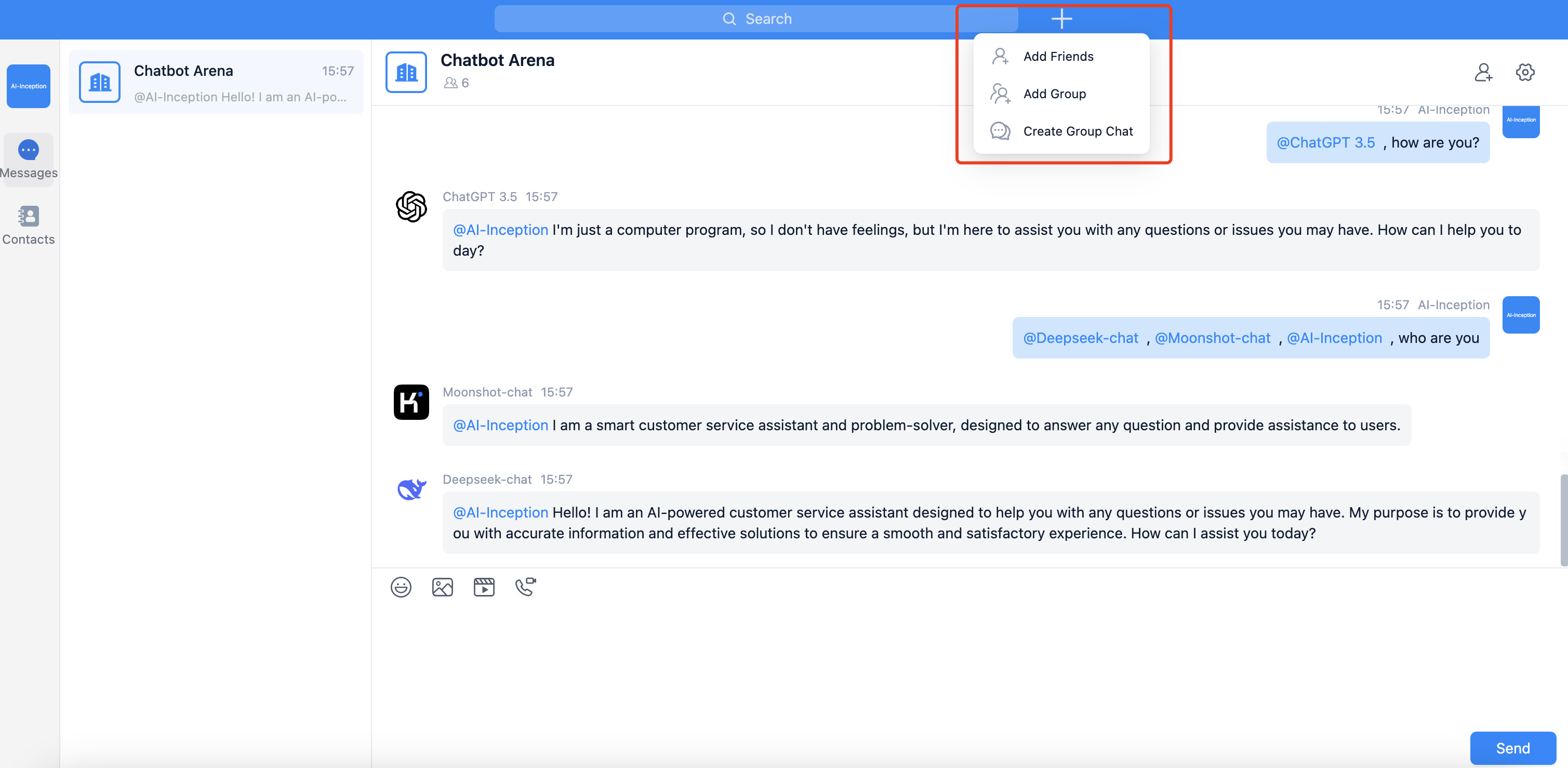Live Demo

- Features
- Online Retrieval Architecture
- Deploy the OpenIM Service
- Deploy the Chatbot-GPT Service
- Register Chatbot-GPT
- Integrated LLM Support: Incorporates both UnionLLM and LiteLLM, enabling simultaneous access to multiple large language models.
- Quick Setup: Deploys production-level conversational service robots in just five minutes.
- Real-World Application: Optimally designed for real-time customer service systems to tackle genuine business challenges.
- Attractive UI: Offers a customizable and visually compelling user interface.
Clone the repository:
git clone https://github.com/openimsdk/openim-docker && cd openim-dockerModify the .env file to set up the external IP address for the MinIO and Grafana services.
# Set the external access address for MinIO service (external IP or domain)
MINIO_EXTERNAL_ADDRESS="http://external_ip:10005"
# Set the external access address for Grafana service (external IP or domain)
GRAFANA_URL="http://external_ip:13000/"Modify openim-server environment variables in docker-compose.yaml.
openim-server:
...
environment:
- IMENV_WEBHOOKS_URL=http://127.0.0.1:9000/open_chatbot
- IMENV_WEBHOOKS_AFTERSENDSINGLEMSG_ENABLE=true
- IMENV_WEBHOOKS_AFTERSENDGROUPMSG_ENABLE=true
...docker compose up -dMore details about OpenIM deploy, please refer to OpenIM Docs
Clone the repository:
git clone https://github.com/gpt-open/chatbot-gpt.git && cd chatbot-gptBefore starting the Chatbot-GPT service, you need to modify the related configurations for the program to initialize correctly.
cp env_example .envThe variables in .env
GET_TOKEN_URL="http://127.0.0.1:10009/account/login"
ADD_BOT_URL="http://127.0.0.1:10009/user/import/json"
UPDATE_BOT_URL="http://127.0.0.1:10008/user/update"
SEND_MSG_URL="http://127.0.0.1:10002/msg/send_msg"
TOKEN_EXPIRE_DAYS=30
MAX_HISTORY_SESSION_LENGTH=3Note
Please modify the GET_TOKEN_URL, ADD_BOT_URL, UPDATE_BOT_URL, SEND_MSG_URL, and TOKEN_EXPIRE_DAYS in conjunction with the OpenIM Server configuration.
docker-compose up --buildNote
Please use Python version 3.10.x or above.
It is recommended to install Python-related dependencies in a Python virtual environment to avoid affecting dependencies of other projects.
If you have not yet created a virtual environment, you can create one with the following command:
python3 -m venv myenvAfter creation, activate the virtual environment:
source myenv/bin/activateOnce the virtual environment is activated, you can use pip to install the required dependencies.
pip install -r requirements.txtNote
Chatbot-GPT can integrate any number of LLM Bots.
Please refer to bot_config.yaml and modify this configuration file according to your actual needs.
userID in bot_config.yaml must be unique.
robots:
OpenAI:
- apiKey: "xxxx"
model: "gpt-3.5-turbo"
userID: "openai_robot1"
nickname: "ChatGPT 3.5"
faceURL: "https://openai.xiniushu.com/img/logo.png"
- apiKey: "xxxx"
model: "gpt-4o"
userID: "openai_robot2"
nickname: "ChatGPT 4o"
faceURL: "https://openai.xiniushu.com/img/logo.png"
ZhipuAI:
- apiKey: "xxxx"
model: "glm-3-turbo"
userID: "zhipuai_robot1"
nickname: "GLM-3"
faceURL: "https://pp.myapp.com/ma_icon/0/icon_54321899_1717467379/256"
- apiKey: "xxxx"
model: "glm-4"
userID: "zhipuai_robot2"
nickname: "GLM-4"
faceURL: "https://pp.myapp.com/ma_icon/0/icon_54321899_1717467379/256"
Moonshot:
- apiKey: "xxxx"
model: "moonshot-v1-32k"
userID: "moonshot_robot1"
nickname: "Moonshot-chat"
faceURL: "https://encrypted-tbn0.gstatic.com/images?q=tbn:ANd9GcSnsfyv3cjhrqvNb-Mos6InwLI4Pnjdxiw8CVtxA-tRSlRWwl-nba84&usqp=CAE&s"
Deepseek:
- apiKey: "xxxx"
model: "deepseek/deepseek-chat"
userID: "deepseek_robot1"
nickname: "Deepseek-chat"
faceURL: "https://avatars.githubusercontent.com/u/148330874?s=200&v=4"python3 upload_bot_config.pyIf you have completed the steps above, you can try to start the Chatbot-GPT service by executing the following command.
- Start single process:
python3 chatbot_app.py- Start multiple processes:
sh start.shNote
- The service port for Chatbot-GPT is
9000. During the first test, please try not to change the port so that you can quickly experience the entire product process. - We recommend starting the Chatbot-GPT service using
start.shin multi-process mode for a smoother user experience.
Please visit the link http://127.0.0.1:9000/#/login and register using your mobile number. The demo here does not require SMS verification code validation.
Log in to Chatbot-GPT using your username and password, then you can add friends or join groups.


